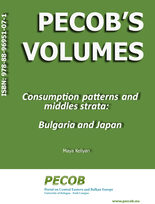and Balkan Europe
by IECOB & AIS Università di Bologna

This area collects and offers a wide range of scientific contributions and provides scholars, researchers and specialists with publishing opportunities for their research results
Consumption patterns and middle strata: Bulgaria and Japan
by: Maya Keliyan
pp: 199
ISBN: 978-88-96951-07-1

Abstract
The goal of the dissertation is by studying consumption patterns, to establish the general and specific characteristics and trends of Bulgarian and Japanese society, the place and role of their middle strata in these two consumer societies. Consumption is accepted as a key to understanding our day societies and their social structures, peculiarities and transformations. Despite the obvious differences, there are also important common points between Bulgaria and Japan. There have been processes of “late” and “state-conducted” modernizations similar in nature, orientation, and objectives, in the third quarter of the 19th century and again after 1945. Also similar are the trends in social structuring during these historical periods and the models of recruitment and development of the different social strata. Japanese consumption patterns are exemplary for postmodern lifestyle and Bulgarian consumption patterns are very descriptive for post-communist socio-structural changes. In the text use is made of a new and specific methodological approach to the consumption patterns, which lies in the research field of social stratification theories. Consumption patterns are seen as leading indicator of social status and position of different social groups and strata in contemporary societies. They are used as a research
tool for comparative study of contemporary societies situated at various stages of development. Middle classes, due to their particular position and importance in contemporary world, have asserted themselves as social groups formation that perform an innovative, active, and stabilizing role in contemporary societies with respect to the lifestyle. The study traces the Bulgarian and Japanese socio-structural changes after WWII, focusing on post-communist and postmodern consumption and lifestyle peculiarities. Consumption patterns of various social groups, categories and strata in Bulgaria and Japan are investigated, paying special attention to middle strata and to their lifestyle.
The dissertation ends with conclusion that in post-communist Bulgaria, like in postmodern Japan, consumption patterns are becoming an increasingly important indicator of social stratification. The Bulgarian middle classes are clearly becoming the main bearers of trends that draw us closer to lifestyle in Japan with their orientation to information technologies, leisure, communication and a healthy way of life. The rich statistical information, as well as the results of numerous empirical
sociological surveys conducted in Bulgaria and Japan, some of them by the author, have been analyzed in the work. The data are presented in various figures, tables and graphs.
Keywords
Consumption, Consumption Patterns, Middle Strata, Lifestyle, Postmodern society, Bulgaria, Japan.
Table of contents
Abstract
Keywords
Introduction
Chapter one: consuption patterns and social stratification
1. Consumption patterns: a new postmodern “key” for understanding contemporary societies
2. Consumption: the Development and Typology of Methods and Approaches to the Study of Consumption
3. Consumption and Lifestyle : Consumption patterns
4. The middle strata and contemporary consumption
Chapter two: consumption patterns, social - structural
Transformations, and middle strata patterns of development in Bulgaria
1. Consumption and social structuring in bulgaria during communism
2. Consumption patterns in post-communist Bulgaria and the importance of the middle strata as consumers
3. The middle strata in the formation of bulgarian consumer society
Chapter three: the middle strata in Japanese consumer society.
1. Japanese consumption patterns: basic characteristics, stages, defining trends, and the role of the middle strata.
2. Development, establishment, and particularities of the Japanese middle strata consumption patterns: the consumer universe of the department store
3. The Japanese middle strata
4. Changes in Japanese society and in the consumption patterns of the middle strata in the late 20th and early 21st century
CONCLUSION
REFERENCES
All web resources were accessed in the end of April, 2013
Web resources


 Download the full volume!
Download the full volume!





